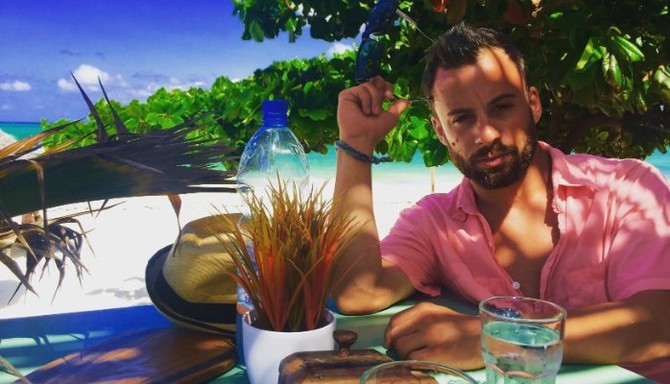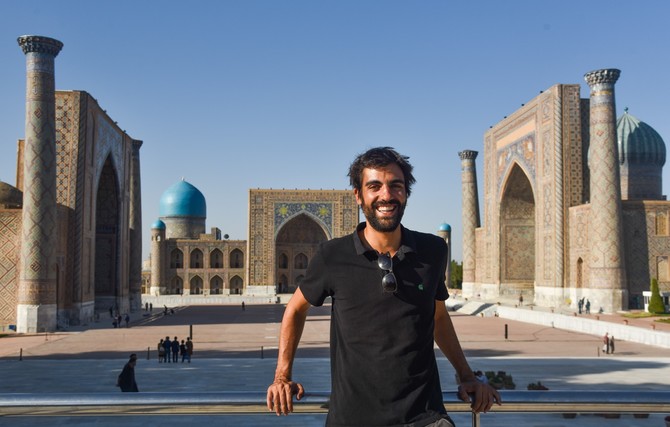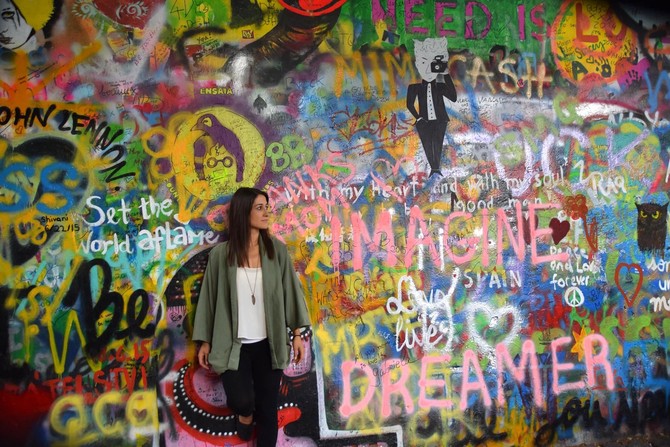DAMMAM: Traveling to exotic locations around the world without having to worry about running out of vacation days or how you will pay the bills is a dream that many of us may want to live out.
However, this nomadic lifestyle is a reality for some brave individuals, including some who previously lived in Dubai, who are choosing to live as digital nomads.
A digital nomad is a person who works remotely, via technology, and is not tied to a physical location. This could mean retaining the same job, but without the restrictions of an office or it could even mean changing career altogether.
Kate Smith, a former project manager at an advertising agency in Canada, left her dreary nine-to-five cubicle job to pursue the nomadic lifestyle and has not looked back since.
Long working hours and the daily grind had started to take a physical and mental toll on Smith. Ultimately, she desired flexibility and the ability to travel more. Ever since she quit her job and booked a one-way ticket to Prague in 2015, Smith has traveled to more than 23 countries and has lived in 12 countries over a span of two years. This month, she has chosen Bali as her home and office.
Smith employed the services of a US-based company called “Remote Year,” which offers a year-long travel experience. According to the company’s website, 75 like-minded professionals with remote jobs work around the world for a year, spending each month in a new country. They pay for each month and services include travel between countries, a private bedroom, access to a co-working space, Wi-Fi and professional, cultural or social experiences in the country.
During her time with Remote Year, Kate identified a gap in the program — only people who had a remote job were eligible to apply. She then started “WiFly Nomads,” which enables a digital lifestyle by providing the necessary facilities and services, including a SIM card, accommodation, co-working space, high-speed Internet, workshops on how to remain productive while traveling, excursions in the new country and even assistance with finding a remote job or starting your own remote business.
Several Dubai-based professionals have also left their fast-paced, stressful corporate jobs to pursue the digital nomad lifestyle. After working for three years in the marketing department of an international FMCG company, Joan Torres decided he had had enough of the 14-hour work days. Even five weeks of annual vacation could not make up for stress at the workplace and he regretted not dedicating enough time to travel. Andrew Miller, who worked in the Dubai tech industry for five years was tired of paying rent in expensive cities. Later, his company was acquired, which left him with no job.
These days, Miller works as a remote marketing consultant, assisting early-stage start-ups with launch, strategy, content creation, social media and blogging. He is currently in the Czech Republic and will then fly off to Puerto Vallarta, Mexico.
“Travel helps me learn about cultures and new languages. In the past few years of traveling, I have learnt Spanish and gotten pretty good at Arabic, Hindi/Urdu, French, Italian, Russian, and Yoruba,” Miller told Arab News.
Torres took a different path and combined his passions — photography and writing — to start a travel blog called “Against the Compass,” writing about off-the-beaten-path destinations. He currently lives and writes in Uzbekistan and is enjoying his newfound freedom.
As many professions take to the Internet and four-walled offices become a thing of the past, many people are trading in the stability and structure of a full-time corporate job for the digital nomad lifestyle. Such a lifestyle provides flexibility, greater ownership of work, personal development, a wealth of travel experiences, social and cultural awareness and, most importantly, a sense of belonging to a global community.
As Greg Caplan, founder and CEO of Remote Year, says: “At the core of the remote revolution is the potential to be a better global citizen and move through the world with purpose, cultural sensitivity and awareness.”
Torres says the digital nomad lifestyle has helped him go “beyond all the general misconceptions (of a country) and understand the world better.”
For Kate, the experience has expanded her horizons and perspective.
“I’ve met a diverse group of lawyers, entrepreneurs and bloggers and they can all teach you something. It gives you a better understanding of the world as a whole. You learn to appreciate what you have back home, but also appreciate where you are at the same time.”
So, will you ditch the nine-to-five grind and go digital?
The life of a digital nomad: Is it for you?
The life of a digital nomad: Is it for you?

Rapper Werenoi, France’s biggest-selling music artist in recent years, dies at age 31

PARIS: Rapper Werenoi, France’s biggest-selling music artist in recent years, has died at the age of 31, his producer and record company said.
The artist, whose real name was Jérémy Bana Owona, was the number 1 album seller in France in 2023 and 2024 according to the ranking of the National Union of Phonographic Industry, which includes in-store and e-commerce sales as well as plays on streaming services.
“It’s with immense sadness that we’ve learned of Werenoi’s passing,” his record company Believe said on Instagram. “All our thoughts are with his family, loved ones, his team and everyone who knew him.”
“Rest in peace my brother, I love you,” his producer Babs posted on X.
French media report Werenoi died early Saturday in a Paris hospital. The cause of his death has not been made public.
Werenoi first became known to the French public in 2021 when he posted his song “Guadalajara” on YouTube and it was viewed hundreds of thousand times.
He released three albums, “Carré” in 2023, “Pyramide” the next year and “Diamant Noir” last month, making him one of the biggest names in French rap.
Several French rappers posted tributes on social media. French-Malian pop star Aya Nakamura, who featured on his second album, wrote : “Rest in peace my dude. A news that saddens me and courage to the loved ones especially.”
“He made a difference for the quality of his songs, his melodies and his punchlines,” singer Pascal Obispo, who had accompanied Werenoi on the piano at a 2023 Paris concert, told French newspaper Le Parisien.
Adidas, Puma family feud to be turned into TV series

CANNES: The bitter brotherly feud that sparked the creation of sports-shoe brands Adidas and Puma in the same small German town in the 1940s is to be turned into a television series with the help of family archives, its producers announced Sunday.
Hollywood-based film producer No Fat Ego is backing the project, which has the blessing of the family behind the Adidas empire founded by Adolf “Adi” Dassler.
It will delve into one of the most fascinating fraternal blow-ups in corporate history, which pitted Adi against his brother Rudolf (“Rudi“) who went on to create rival Puma.
The two men jointly ran a family-owned footwear company before falling out during World War II, with their post-conflict animus splitting their town of Herzogenaurach to this day.
Scriptwriter Mark Williams, behind the hit Netflix series “Ozark,” has been hired to lead the project and is currently going through Dassler family home videos and memorabilia to work on the story.
“Everybody knows the brands, but the story behind them is something we don’t really fully know,” Williams told AFP at the Cannes film festival.
One of the most sensitive areas — particularly for the reputations of the multi-billion-dollar footwear companies today — will be how the brothers are portrayed during the war period.
Both became members of the Nazi party in the 1930s, as was customary for the business elite at the time.
Rudi went to fight, however, and was arrested by Allied forces on his return to a defeated Germany.
“Adi stayed home and tried to keep the company alive,” Williams added.
Their factory was seized as part of the war effort and converted into a munitions plant.
The series promises to be a “Succession-type drama between the family” set over several generations, Williams explained, comparing it to the earlier hit HBO series.
The head of No Fat Ego, Niels Juul, who has produced Martin Scorsese’s most recent movies, said he was originally drawn to the story after learning about Adidas’s collaboration with legendary black American runner Jesse Owens.
Partly thanks to Adidas’s innovative spiked shoes, Owens became one of the stars of the 1936 Berlin Olympics which Hitler had hoped would showcase white German supremacy.
No Fat Ego intends to develop the series with full editorial independence before offering it to streaming platforms.
“We want to have the creative control, and Mark has to have absolute silence and quiet to do what he does,” Juul told AFP.
Iraq’s first filmmaker in Cannes says sanctions no piece of cake

CANNES: Hasan Hadi, the first filmmaker from Iraq to be selected for the prestigious Cannes Festival, said economic embargoes like those imposed in his childhood under Saddam Hussein did not work.
“Sanctions empower dictators,” he told AFP, as they concentrate scant resources in their hands and only make them “more brutal.”
“In the history of the world, there was no one time when they (imposed) sanctions and the president couldn’t eat.”
Hadi’s first feature film, “The President’s Cake,” has received very good reviews since premiering Friday in the Directors’ Fortnight section.
Cinema publication Deadline said it was “head and shoulders above” some of the films in the running for the festival’s Palme d’Or top prize, and “could turn out to be Iraq’s first nominee for an Oscar.”
The film follows nine-year-old Lamia after she has the misfortune of being picked by her school teacher to bake the class a cake for the president’s birthday, or be denounced for disloyalty.
It is the early 1990s, the country is under crippling UN sanctions. She and her grandmother — with whom she shares a reed home in Iraq’s southern marshlands — can barely afford to eat.
As they set off into town to hunt down unaffordable ingredients, with Lamia’s pet cockerel and their last meagre belongings to sell, the film plunges into the social reality — and everyday petty corruption — of 1990s Iraq.
The near-total trade and financial embargo imposed on Iraq after it invaded Kuwait “demolished the moral fabric of society,” Hadi said.
It sent the country “hundreds of years back.”
The filmmaker said he did not taste cake until he was in his early teens, after the US-led invasion in 2003 toppled Saddam and sanctions were lifted.
Instead, with processed sugar and eggs out of reach, there was “date cake” — whose main ingredient was squished dates, sometimes with a candle on top.
“As a kid you’re sad that you’re not getting your cake,” he said. But as you grow up, you realize what your parents must have gone through to put food on the table.
“Not only my family, but all of these people had to sell literally everything,” he said. “There were people that were even selling their door frames.”
Hadi and his team shot the film entirely in Iraq.
It beautifully captures the ancient wetlands in the south of the country, listed as a World Heritage Site since 2016 and reputedly the home of the biblical Garden of Eden.
Saddam drained them in the 1990s, trying to flush out rebels hiding in the reeds.
But after the US-led invasion, authorities opened up the valves and the wetlands flourished again — even if they are now threatened by climate change.
Hadi said he chose the location partly to make the point that “the marshes stayed and Saddam went away.”
To re-create the Iraq of his youth, Hadi and his crew paid close attention to detail, amassing vintage clothes and bringing a barber on set to trim the hair and moustaches of everyone down to the extras.
They scouted out the best locations, shooting one scene in a small eatery reputed to have been frequented by Saddam himself.
They chose non-actors to play ordinary Iraqis under the ever-present eyes of the president in posters, pictures frames and murals.
Hadi said hearing US President Donald Trump say recently that he planned to lift sanctions on Syria after Islamists toppled president Bashar Assad last year was “amazing.”
“I don’t think the sanctions helped in any way to get rid of Bashar, but definitely empowered him to kill more people, and torture more people,” he said.
Austria wins Eurovision crown with JJ’s song Wasted Love

BASEL, Switzerland: Austria won the Eurovision Song Contest 2025 in Swiss host city Basel on Saturday, with the country’s first victory since bearded drag queen Conchita Wurst won in 2014.
Operatic singer JJ won ahead of Israel in the world’s biggest music competition, which was watched by more than 160 million people across the world.
The win was Austria’s third in the competition, following Conchita’s success and Udo Juergens’ victory in 1966.
JJ, a 24-year-old from Vienna, combined elements of opera, techno and high-pitched vocals in his song Wasted Love, winning the hearts of the professional juries and telephone voters.
Switzerland won the right to host Eurovision after Swiss rapper and singer Nemo won last year’s contest in Malmo, Sweden.
Fans traveled from across Europe and beyond to Basel, with 100,000 people attending Eurovision events in the city, including the final.
Eurovision, which stresses its political neutrality, has also faced controversy again this year due to the war in Gaza.
Israel’s entrant, Yuval Raphael, was at the Nova music festival during the October 7, 2023, attack by Hamas militants on southern Israel that killed 1,200 people and saw 251 taken hostage, according to Israeli officials.
Pro-Palestinian groups urged the European Broadcasting Union to exclude Israel over Gaza, where more than 50,000 people have been killed in the ensuing offensive by Israel, according to local health officials.
Around 200 protesters mounted a demonstration in Basel on Saturday evening.
Spanish public broadcaster RTVE also showed a message before the start of the Eurovision show saying “When human rights are at stake, silence is not an option. Peace and Justice for Palestine.”
Man badly hurt by falling palm tree at Cannes film festival

- The Asian man, believed to have been attending the festival, was badly injured
- A sudden gust of wind brought the tree down
CANNES: A man was seriously hurt after a palm tree fell onto him at the Cannes film festival on Saturday.
The Asian man, believed to have been attending the festival, was badly injured, firemen who treated him at the scene said.
A sudden gust of wind brought the tree down near the Palais des Festivals on the Croisette esplanade overlooking the Mediterranean, an AFP journalist at the scene said.
The accident happened as the American movie “Eddington,” starring Joaquin Phoenix, Emma Stone and Pedro Pascal was being shown.
The Croisette was crowded with festivalgoers when the tree fell, witnesses said.
“There was a terrible gust of wind and I heard a cry,” said Marthy Fink from Luxembourg.























